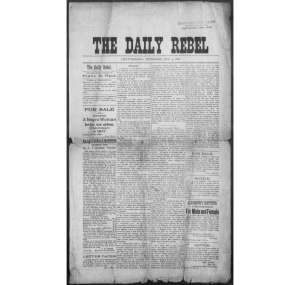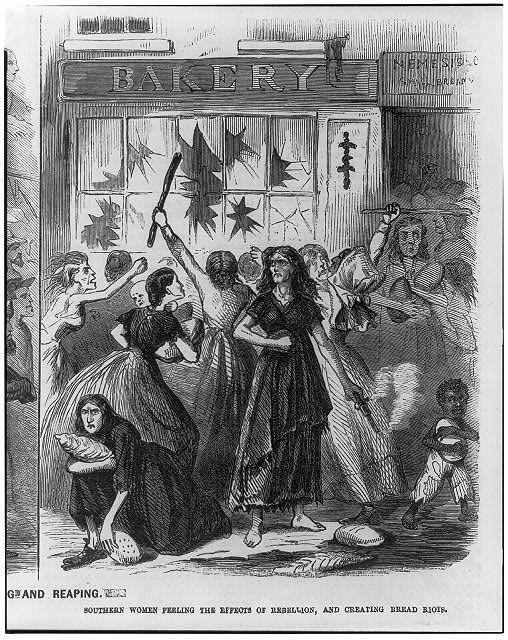Hope springs eternal?
Food was scarce throughout the Confederacy in the spring of 1863. “In a dozen or more cities and hamlets from Richmond to Mobile, desperate women raided shops or supply depots for food.”[1] A week after the Richmond Bread Riot a newspaper in the Confederate capital found the early wheat crop promising in three southern states.
From the Richmond Daily Dispatch April 9, 1863:
The crops.
From different quarters of the Confederacy we receive encouraging accounts of the prospects of the growing crops of wheat. The Rome (Ga.)Courier says “from what it has seen and heard, the wheat crop is looking fine, and promised well.”
A farmer of long experience and observation, writes to the Chattanooga Rebel, from Middle Tennessee, as follows: “There has never been in my recollection, a session which afforded us so much hope. The wheat is coming up beautifully, fresh and lively. I calculate to raise a large overplus beyond last year.”Others verbally and by letter confirm this statement. The editor add[s]: “The gentle rains of spring now coming with April weather, will, by the goodness of God, give us barns loaded to over flowing next fall. We have only to collect our crop.”
The papers state that the wheat crop in Mississippi lo[o]ks very promising — in fact, it could not look better. There is a large surface of soil in wheat, promising flour in abundance after the May harvest. If there are no more frosts the opinion is expressed that Mississippi will furnish wheat enough to supply half the Confederacy in flour for the next year.
The Yankee armies in Tennessee and Mississippi might appreciate this news too.
The (Chattanooga) Daily Rebel was another Southern paper that had to move to keep ahead of Union armies. It ended up in Selma, Alabama, where Federal troops destroyed the presses in April 1865. The editors stressed the importance of the press:
On September 27, 1862, the Rebel ran an article championing the press’s vital role in wartime communications. The piece was entitled “The Importance of the Press in Time of War” and was signed, “PRINTER.” It strongly emphasized the importance of (the Confederate) press to both the government and military, as well as citizens. “The importance of the Press in time of war to the spirit of the army is incalculable. It is, as one of our correspondents observes, ‘the only medium of organized public opinion—the only source of communication between the Government and the people, and which if silenced (as the Senate and House propose) would leave these wise bodies themselves practically as voiceless as the grave.’”
- [1]McPherson, James M. The Battle Cry of Freedom: The Civil War Era. New York: Ballantine Books, 1989. Print. page 617.↩


